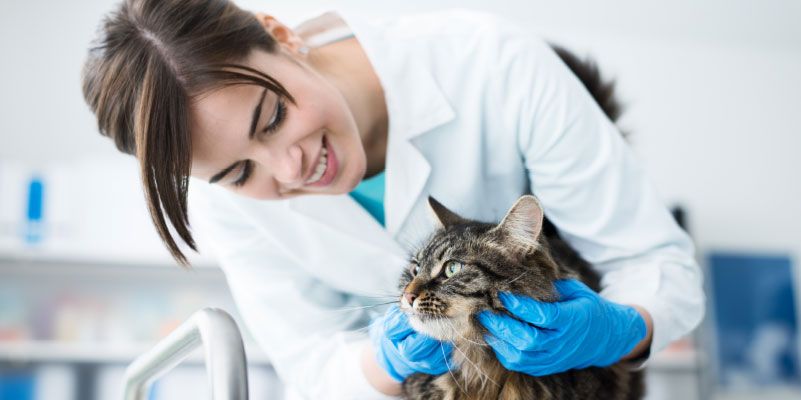Vaccination has revolutionised control of infectious disease in our pets. It is essential that all pets are adequately vaccinated to help protect the pet population as a whole. Responsible pet care requires kittens to be given their initial course of vaccinations, but this cannot protect them for the rest of their lives. Adult cats require regular vaccination to maintain immunity against disease
Please give us a call to discuss a suitable vaccination regime for your pet kitten or cat.

![]()
Kitten Vaccination
Kittens are temporarily protected against many diseases by antibodies received through their mother’s milk. These maternal antibodies decline in the first few weeks of their lives, after which they need a vaccination to induce immunity. The age at which maternal antibodies drop enough to require vaccination is highly variable, which is why a series of vaccinations is necessary in a kitten
![]()
Adult Cat Vaccination
The immunity from kitten vaccination weakens over time and your pet can again become susceptible to disease. Annual health checks and booster vaccinations, as required, will provide the best protection for the life of your pet.
![]()
After Vaccination Care
Following vaccination your cat may be off-colour for a day or two, or have some slight swelling or tenderness at the injection site. Access to food and water and a comfortable area to rest are usually all that is required for a quick recovery. However, if the response seems more severe, you should contact us for advice.

Calicivirus is a disease which is shed and spread through ocular, nasal or oral secretions. It causes upper respiratory symptoms such as sneezing, conjunctivitis and nasal discharge most commonly. Some cats become severely affected and develop pneumonia and difficulty breathing.
Herpesvirus is a widespread viral infection that often causes sneezing, nasal discharge and conjunctivitis. Cats are often very lethargic, develop fevers and become anorexic. Once infected, cats can get flare ups life-long in times of stress which can lead to repeated bouts of conjunctivitis, even corneal (the surface of the eye) ulceration.
Panleukopenia is feline parvovirus and leads to severe depression, anorexia, vomiting, diarrhoea, wobbliness/incoordination and seizures. It is highly contagious and deadly. Even with intensive and expensive medical treatment, only 50% of patients survive. Kittens are particularly susceptible.
Chamydiosis is widespread and highly contagious. It most often causes severe conjunctivitis as well as other respiratory symptoms.
Feline Leukemia Virus can cause fever, weight loss, anaemia, immune mediated disorders and more. It is considered an oncogene which can cause several life-threatening to fatal tumours to develop – most commonly, lymphoma and leukemia. There is no cure.
Feline Immunodeficiency Virus is transmitted through biting/fighting and although some cats are asymptomatic for years, others develop fever and lethargy. There is no cure and eventually, years later, immunosuppression leads to a higher potential for secondary disease to cause severe and life-threatening illness. Those cats who are outdoors or have an affinity for fighting with other neighbourhood cats are at highest risk.
